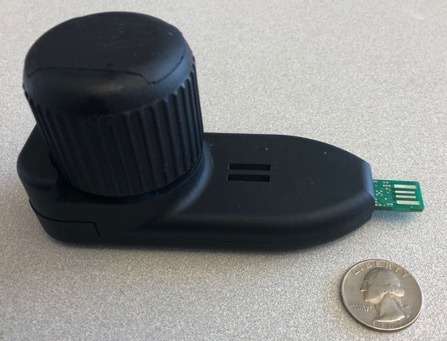
Paul Yager, Ph.D.
AIMBE College of Fellows Class of 2000 For his contributions to the field of microfluidics and design of devices and systems for the analysis of biological fluids.
Paul Yager developing rapid COVID-19 tests for the home and clinic
Via University of Washington | June 11, 2020
A working, early prototype of the Yager lab’s screening device, which would allow users to test for COVID-19 at home.
At the onset of the COVID-19 pandemic, Paul Yager, professor of bioengineering, knew a rapid and accurate test would be needed to screen patients for the new coronavirus. He immediately set to work adapting his point-of-care testing research to developing an at-home test for the new virus.
Since 2011, his lab has been developing compact, low-cost screening tests that can detect illnesses such as flu, dengue fever and HIV, and can be used by anyone, anywhere. The Yager lab’s technology uses nucleic acid amplification tests (NAAT) coupled with microfluidic devices to detect fragments of a pathogen’s genetic material in under 20 minutes. It offers a simpler and faster alternative to traditional gene-based testing, which requires a complicated lab process that takes a few hours to get reliable results.
Now, the Yager lab is applying its technology, called UbiNAAT, to COVID-19 tests, which could be used by untrained people in their homes as well as in health care facilities and low-resource settings around the world. The tests could also be used for screening at airports, workplaces, theaters and sporting events to identify carriers of the virus and limit its spread… Continue reading.
...Coronavirus Testing Shouldn’t Be This Complicated
Via The Verge | March 30, 2020Engineers have the technology to make it better
The US reported its first confirmed case of COVID-19 on January 21st. Eight weeks later, there still aren’t enough tests for the virus available for everyone who needs them. “It is a failing,” said Anthony Fauci, director of the National Institutes of Allergy and Infectious Diseases, at a House briefing last week. “The system is not really geared to what we need right now.”
People who are sick or have been in contact with sick people are struggling to get tested. Until last week, the number of tests that could be run per day in the United States was limited to around 7,000. Labs are struggling to get the supplies they need to meet the demand.
…
PCR is the gold-standard testing platform for viruses because it’s highly sensitive, says Paul Yager, a professor in the department of bioengineering at the University of Washington — it can detect even a tiny amount of virus in a patient sample and is less likely to incorrectly have a negative result… Continue reading.
...Paper Diagnostic Tests Could Save Thousands of Lives
Via U. Washington | March 29, 2016An article published online March 25 in Scientific American reports on efforts by UW Bioengineering Professor Paul Yager and other researchers to develop paper-based disease diagnostics technology. The tests being developed by Dr. Yager and others offer a fast, inexpensive, highly sensitive and simple testing platform that anyone can use, anywhere, without needing access to power, running water or special equipment. The devices could lead to faster treatment, limit spread of infectious disease, save hundreds of thousands of lives in the developing world, and reduce the cost of health care in developed countries by allowing home-based testing… Continue reading.
...Paul Yager Receives Over $4M To Continue Developing Paper-Based Diagnostic Device
Via U. of Washington | August 11, 2015UW Bioengineering Professor Paul Yager has received $4,197,407 of funding from the U.S. Department of Defense/Defense Advanced Research Projects Agency (DARPA) to continue a project which aims to develop a small, paper-based device that could quickly test for infectious diseases in low-resource environments. With this new funding, Dr. Yager is the third-highest recipient of research funding amongst UW Medicine faculty in Q2 2015 (April-June), according to a July report from the UW Medicine Office of Research and Graduate Education.
This new award adds to nearly $14M of funding previously awarded to the project, Multiplexable Autonomous Disposables for Nucleic Acid Amplification Tests for LRSs (MAD NAAT). The MAD NAAT project investigates the potential applications of the 2-dimensional paper network (2DPN) for point-of care diagnosis of infectious disease. The project has seen rapid progress from an ambitious concept to its current iteration as a feasible platform with promising potential for broad applications.
... AIMBE
AIMBE
